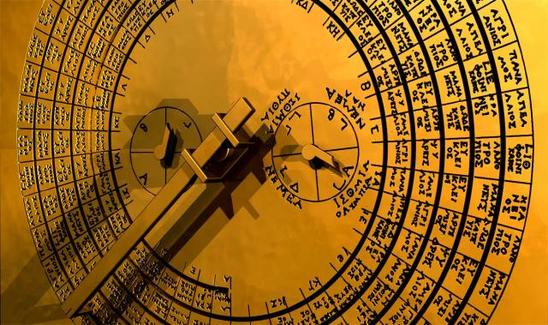Antikythera shipwreck yields bronze arm – and hints at spectacular haul of statues
Arm points to existence of at least seven statues from Greek shipwreck, already the source of most extensive and exciting ancient cargo ever found
(The Guardian)
 The delicate workings at the heart of a 2,000-year-old analogue computer have been revealed by scientists. The Antikythera Mechanism, discovered more than 100 years ago in a Roman shipwreck, was used by ancient Greeks to display astronomical cycles.
The delicate workings at the heart of a 2,000-year-old analogue computer have been revealed by scientists. The Antikythera Mechanism, discovered more than 100 years ago in a Roman shipwreck, was used by ancient Greeks to display astronomical cycles.(BBC news: Ancient Moon 'computer' revisited)
The Antikythera mechanism, as it is now known, was originally housed in a wooden box about the size of a shoebox, with dials on the outside and a complex assembly of bronze gear wheels within. X-ray photographs of the fragments, in which around 30 separate gears can be distinguished, led the late Derek Price, a science historian at Yale University, to conclude that the device was an astronomical computer capable of predicting the positions of the sun and moon in the zodiac on any given date. A new analysis, though, suggests that the device was cleverer than Price thought, and reinforces the evidence for his theory of an ancient Greek tradition of complex mechanical technology.
(The Economist: The Antikythera mechanism-The clockwork computer)
The secrets of one of the most remarkable technological finds from Ancient Greece have been probed for
the first time using powerful X-ray imaging equipment, specially shipped to Athens.
The Antikythera Mechanism as it is known, is regarded as the world's oldest "computer" and is thought to have been used to predict solar and lunar eclipses and record dates of the ancient Olympiad. Its remains were recovered from a Roman shipwreck off the southern coast of Greece in 1901.
(BBC news: Probing the secrets of the Antikythera Mechanism)

Hublot offers a chance to own one off “Antikythera” watch to collectors
Antikythera is a name associated with an ancient astrological calculator, whose working mechanism is known to be highly precise, and rather complicated its time and age.

Hublot offers a chance to own one off “Antikythera” watch to collectors
Antikythera is a name associated with an ancient astrological calculator, whose working mechanism is known to be highly precise, and rather complicated its time and age.
BORNRICH

Gizmag: Hublot painstakingly recreates a mysterious, 2,100-year-old clockwork relic - but why?
Why on Earth would you want to strap one of these to your wrist? It barely tells the time, and it can't take pictures, tweet or connect to your Facebook. In fact, very few people would have the faintest idea what it is, or why you'd want one at all. But for those that do recognize its intricate gears and dials, this tiny, complex piece of machinery tells a vivid and incredible tale. It's a story of gigantic scientific upheaval, of adventure and shipwreck on the high seas, of war and death. A story of amazing intellect, lost riches and impossible chance - a sunken treasure that Jaques Cousteau once described as "more valuable than the Mona Lisa" - and it's connected with an ancient celebrity whose star shone so brightly that he's still a household name more than 2200 years after his death... Read on!
Gizmag: Hublot painstakingly recreates a mysterious, 2,100-year-old clockwork relic - but why?
 Οι Έλληνες και ξένοι ερευνητές που συνεχίζουν τη μελέτη του παλαιότερου υπολογιστή της ανθρωπότητας επανέρχονται με νέα ευρήματα, τα οποία ενισχύουν ακόμα περισσότερο το μυστήριο που τον περιβάλλει. Ο Μηχανισμός προέβλεπε τους Πανελλήνιους Αγώνες –μεγάλα γεγονότα της εποχής- ενώ τα ονόματα των μηνών σΆ ένα από τα καντράν ήταν γραμμένα σε κορινθιακή διάλεκτο, γεννώντας υπόνοιες για ενδεχόμενη σχέση με ανάλογες επινοήσεις του Αρχιμήδη.
Οι Έλληνες και ξένοι ερευνητές που συνεχίζουν τη μελέτη του παλαιότερου υπολογιστή της ανθρωπότητας επανέρχονται με νέα ευρήματα, τα οποία ενισχύουν ακόμα περισσότερο το μυστήριο που τον περιβάλλει. Ο Μηχανισμός προέβλεπε τους Πανελλήνιους Αγώνες –μεγάλα γεγονότα της εποχής- ενώ τα ονόματα των μηνών σΆ ένα από τα καντράν ήταν γραμμένα σε κορινθιακή διάλεκτο, γεννώντας υπόνοιες για ενδεχόμενη σχέση με ανάλογες επινοήσεις του Αρχιμήδη.(Path Finder: Μηχανισμός των Αντικυθήρων: οι νέες αποκαλύψεις)
NEXT PAGE: Links >>>